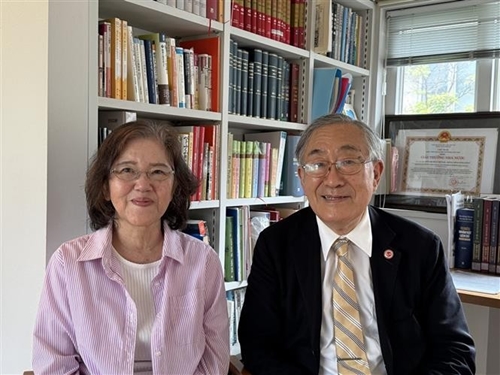In an interview with the Vietnam News Agency (VNA)'s resident correspondents in Japan on the occasion of the 80th anniversary of the August Revolution (August 19, 1945 - 2025) and the National Day (September 2, 1945 - 2025), Professor Furuta noted that just in a short time between Japan’s surrender to the Allies on August 15, 1945 and the arrival of Allied forces in Vietnam, the revolutionary movement swiftly mobilized support of a large number of Vietnamese people.
    |
 |
|
Professor Furuta Motoo and his wife |
He stated that the revolution had three defining characteristics: it occurred at the right moment, garnered immense support from the people, and took place throughout the entire country. He argued that these qualities provided strong legitimacy to the establishment of the Democratic Republic of Vietnam, which has since endured and strengthened into today’s Socialist Republic of Vietnam.
Placing Vietnam’s revolution in a regional and global context, Professor Furuta pointed out that most of Southeast Asia nations were under Japanese occupation during World War II. When Japan was defeated, the region became one of the earliest centers of national liberation struggles. Indonesia’s declaration of independence on August 17, 1945 and Vietnam’s August Revolution just two days later were among the first clear expressions of a global drive for self-determination, he stressed.
From this perspective, Vietnam’s August Revolution carried two important international meanings. First, it spearheaded the worldwide movement for national liberation after World War II. Second, it inaugurated the era of independence in Southeast Asia, drawing global attention to the region.
The Japanese scholar also emphasized the lasting universal values of the revolution. He recalled that President Ho Chi Minh, in proclaiming Vietnam’s independence on September 2, 1945, deliberately cited the immortal words of the U.S. Declaration of Independence and France’s Declaration of the Rights of Man and the Citizen.
The universal significance of the August Revolution lies in affirming national independence as an inseparable part of humanity’s democratic ideals.
While the right of people to self-determination is today enshrined in the United Nations Charter, Professor Furuta argued that Vietnam’s Revolution and Declaration of Independence made a decisive contribution to securing its broader recognition in the immediate post-war years.
He concluded that the revolution’s core spirit was to demonstrate to the world the independence of a unified Vietnam, firmly upheld in solidarity with Southeast Asia - the world’s most vibrant arena of national liberation at the time. That spirit continues to guide modern Vietnam as an active member of ASEAN, seeking deeper integration and contributing to global development.
Source: VNA